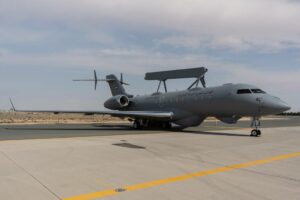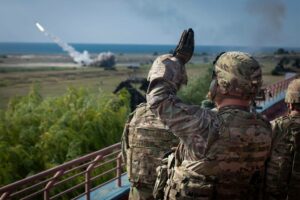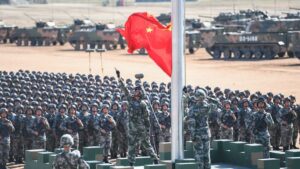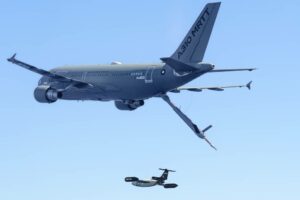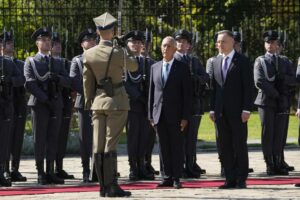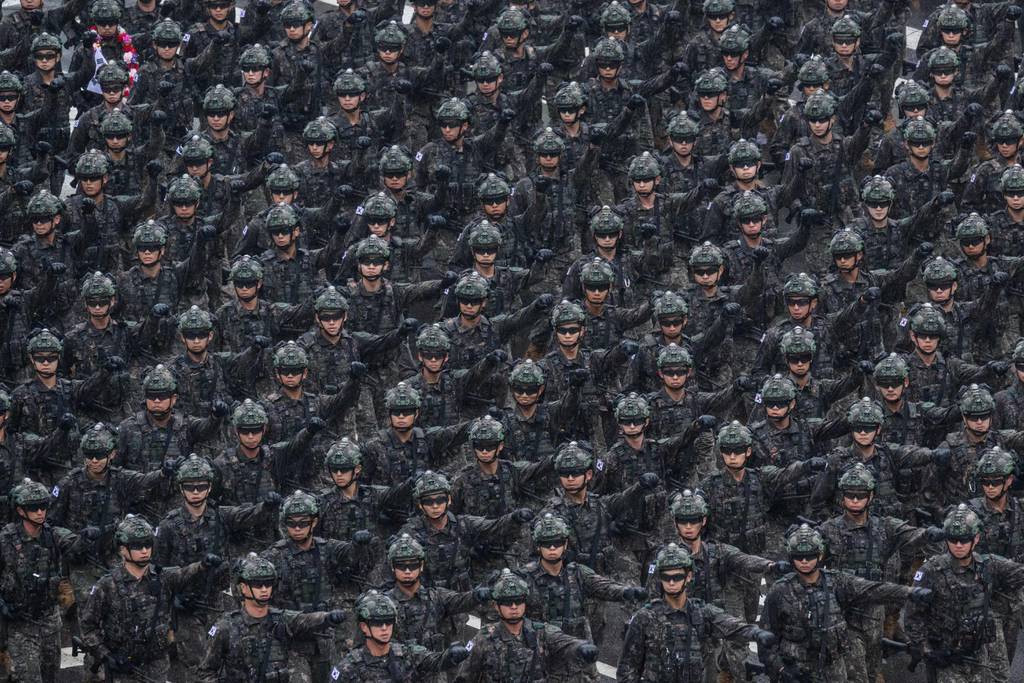
MANILA, Philippines — South Korea plans to spend 346.7 trillion Korean won (U.S. $262.8 billion) in the next five years to bolster its defense capabilities amid, according to the country’s Defense Ministry.
The ministry announced its 2024-2028 midterm defense plan Tuesday, noting an increase of 17.3 trillion Korean won from last year’s version. The budgetary adjustment, which follows North Korea’s Nov. 21 launch of a reconnaissance satellite, calls for improved military capabilities, efforts to maintain troop levels and the modernization of defense facilities.
Specifically, funding to improve defense capabilities increased by 6%, from 107.4 trillion Korean won to 113.9 trillion Korean won; that is now expected to grow by 11.3% annually. This effort involves deterrence measures, growing a preemptive strike capability, and countering North Korean missiles and drones.
The country added 10.8 trillion Korean won to the initial figure of 224 trillion Korean won. That money will support troops and modernization programs to prepare a “strong and combat-ready military,” according to the ministry’s news release. Funding will also help the military reorganize itself to create “strategic units and advanced forces.”
Following North Korea’s satellite launch last month, South Korea suspended a no-fly provision in the 2018 inter-Korean treaty, enabling the South to monitor the North’s activities along their shared border. North Korea reacted by withdrawing from the pact entirely.
Tension escalated after the North reportedly stationed troops at 11 guard posts, established temporary bases and deployed military assets along the 4-kilometer-wide (2.5-mile-wide) Demilitarized Zone. South Korean officials released images to back these claims.
North Korea has also opened more than 10 coastal artillery embattlements along the West Sea, and its guards were seen carrying handguns at the Joint Security Area in breach of a previous agreement. In turn, South Korea announced plans to restore 11 previously dismantled guard posts at the DMZ.
North Korea has committed approximately 17 violations of previous agreements, according to Ju Hyung Kim, a defense analyst at the Seoul-based Security Management Institute think tank. These include the five UAVs North Korea flew in South Korean airspace in December 2022.
And North Korea’s nuclear development program has rendered a 1992 denuclearization agreement between the two countries “practically null,” Kim told Defense News.
South Korea has steadily developed countermeasures against its neighbor, but President Yoon Suk Yeol has called for the development of “overwhelming” wartime capabilities, including what the government refers to as Defense Innovation 4.0, which incorporates advanced technologies, such as artificial intelligence, to the three-axis system — a strategy that informs how the military should respond to an attack from the North.
In March, the government unveiled its so-called Kill Web strategy meant as an improvement to the Kill Chain approach, which would neutralize nuclear and missile strikes as well as directly launch attacks against Pyongyang should the two Koreas enter into armed conflict.
“When given a mission, we must always maintain a readiness to immediately operate the world’s best long-range, ultra-precise and high-power missiles, and resolutely punish enemy provocations,” Defense Minister Shin Won-sik said Friday during a visit to the country’s strategic missile command. “The enemy’s provocation may vary, but your role is to strike the enemy’s heart and head fatally.”
Amid tension on the Korean Peninsula, Kim warned of a possible scenario in which China tries to take Taiwan by force — an island nation Beijing considers a rogue province.
“In such a scenario, it is conceivable that key U.S. assets currently stationed in South Korea could be redirected toward the Taiwan Strait,” Kim said. “This redirection may create a security vacuum that North Korea might exploit, leading to miscalculations regarding the United States’ ability to fully commit its capabilities in a two-front war situation.”
“Therefore, it is crucial for the trilateral partners [South Korea, the U.S. and Japan] to devise a feasible plan to address this potentially drastic scenario and consistently signal to North Korea that a full-fledged military attack against South Korea would not be successful,” Kim added.
Leilani Chavez is an Asia correspondent for Defense News. Her reporting expertise is in East Asian politics, development projects, environmental issues and security.
- SEO Powered Content & PR Distribution. Get Amplified Today.
- PlatoData.Network Vertical Generative Ai. Empower Yourself. Access Here.
- PlatoAiStream. Web3 Intelligence. Knowledge Amplified. Access Here.
- PlatoESG. Carbon, CleanTech, Energy, Environment, Solar, Waste Management. Access Here.
- PlatoHealth. Biotech and Clinical Trials Intelligence. Access Here.
- Source: https://www.defensenews.com/global/asia-pacific/2023/12/13/south-korea-to-increase-defense-spending-over-five-years/
- :has
- :is
- :not
- 10
- 107
- 11
- 17
- 2018
- 2022
- 224
- 7
- 70
- 8
- 9
- a
- ability
- According
- activities
- added
- address
- Adjustment
- advanced
- After
- against
- Agreement
- agreements
- along
- also
- always
- Amid
- an
- analyst
- and
- announced
- Annually
- approach
- approximately
- AREA
- armed
- artificial
- artificial intelligence
- AS
- asia
- asian
- Assets
- At
- attack
- Attacks
- back
- BE
- Beijing
- BEST
- between
- Billion
- bolster
- border
- breach
- but
- by
- called
- Calls
- capabilities
- capability
- carrying
- chain
- China
- claims
- coastal
- commit
- committed
- conflict
- considers
- consistently
- could
- countering
- countries
- country
- country’s
- create
- crucial
- Currently
- December
- Defense
- deployed
- developed
- Development
- devise
- directly
- Drones
- during
- East
- effort
- efforts
- enabling
- Enter
- entirely
- environmental
- established
- expected
- expertise
- Exploit
- facilities
- feasible
- Figure
- five
- follows
- For
- Force
- Forces
- Friday
- from
- full-fledged
- fully
- funding
- given
- Government
- Grow
- Growing
- Guard
- head
- Heart
- help
- her
- How
- HTTPS
- images
- immediately
- improve
- improved
- improvement
- in
- include
- Including
- incorporates
- Increase
- increased
- informs
- initial
- Innovation
- Institute
- Intelligence
- into
- involves
- island
- issues
- IT
- ITS
- itself
- Japan
- joint
- jpg
- Key
- Kill
- Kim
- korea
- Korea’s
- Korean
- Last
- launch
- leading
- levels
- maintain
- management
- March
- May..
- meant
- measures
- Midterm
- might
- Military
- minister
- ministry
- missile command
- missiles
- Mission
- modernization
- money
- Monitor
- Month
- more
- must
- nation
- news
- news release
- next
- North
- North Korea
- noting
- nov
- Nov. 21
- now
- nuclear
- of
- officials
- on
- opened
- operate
- over
- partners
- Philippines
- plan
- plans
- plato
- Plato Data Intelligence
- PlatoData
- politics
- possible
- Posts
- potentially
- Prepare
- president
- previous
- previously
- Program
- Programs
- projects
- provision
- provocation
- Readiness
- refers
- regarding
- release
- released
- rendered
- reportedly
- Reporting
- Respond
- restore
- Role
- s
- Said
- satellite
- scenario
- SEA
- security
- seen
- shared
- should
- Signal
- situation
- South
- South Korea
- south korean
- spend
- Spending
- steadily
- Strategic
- Strategy
- strike
- Strikes
- successful
- such
- support
- suspended
- system
- Taiwan
- Take
- tank
- Technologies
- temporary
- than
- that
- The
- the joint
- The West
- their
- These
- think
- think tank
- this
- to
- told
- toward
- Trillion
- Tuesday
- TURN
- two
- u.s.
- United
- units
- unveiled
- Vacuum
- version
- Violations
- Visit
- war
- warned
- we
- web
- WELL
- were
- West
- What
- which
- will
- withdrawing
- Won
- world’s
- would
- years
- Your
- zephyrnet

